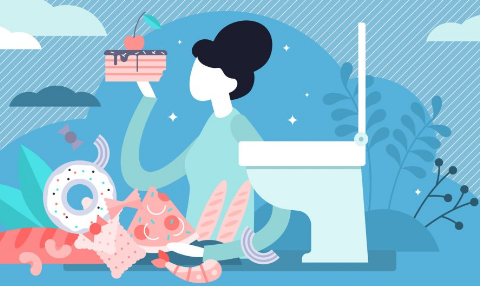Have you heard the term Bulimia Nervosa? This is an eating disorder characterized by binge eating qualities followed by an attempt to purge the food by vomiting, taking laxatives, diuretic or performing strenuous exercise. People are practicing this habit to avoid gaining weight.
The Academy for Eating Disorders had written several studies about this condition which is increasingly becoming global. The term Bulimia Nervosa was first described by British psychatrist Gerald Russel in 1979. He said that Bulimic people are commonly hereditary of about 50 – 84% chance of success.
Eating disorder cases are commonly in groups that emphasizes fit and slim body such as dance groups, ballet, gymnastics, modeling, cheerleading, figure skating and many other athletic careers. Also, teenage women are more likely to develop this disorder than men by overwhelming 90% ratio. Bulimia disorder is also more prevalent among Caucasians and Americans because they value a sexy or slim image more than any other else.
Similar with Anorexia Nervosa, bulimic people fears gaining weight, not satisfied with their physique and is desperately seeking weight loss. However, bulimia can develop within the normal range for age and weight. Let’s take a deeper look into this unique eating disorder.
Causes of Bulimia Nervosa
The most common causes are biological and of course social factors. Biological findings suggests that abnormal functions of serotonin and other hormones such as sex hormones, causes this kind of eating behavior. Bulimic people have shown signs of hyperandrogenism and polycystic ovary syndrome, both condition which affects appetite control.
On the other hand, social factors are said to be one of the main causes why more women follows an eating habit outside normal behaviors. Socio-cultural etiology became one of the most responsible cause for the spread of this eating disorder together with the media. Continuous promotion of being fit and sexy gives big pressure to female Americans to keep up with their accepted physique “culture”.
As I have said earlier, bulimia nervosa is also hereditary. If you have a sister or a family history of bulimia, you are more likely to develop this condition as well. People who diets more often and values physical appearance as an important aspect of living, are more likely to develop bulimia.
Lastly, people who suffered traumatic or stressful events may also develop this disorder. Events such as rape, discrimination, accidents and many others, can all lead to bulimia.
Signs and Symptoms of Bulimia Nervosa
The common belief is that, only white teenage women suffers from this kind of disorder. Well, that is not always the case. It can happen to anyone even males and older women. So how can an individual become bulimic or can be considered having bulimia?
Like any other eating disorders, bulimia nervosa is considered as a mental disease. If you show any symptoms listed below, then you probably starting to develop bulimia.
- mood swings
- excessive exercise
- low-self esteem
- depression
- too much fixation on calorie foods
- irregular menstrual cycle
- too much consumption of diet pills
- extremely weight conscious
- constant trips to bathroom (vomiting activities)
Having too many beliefs with regards to eating can also be a sign of bulimia. Other known psychiatric illnesses, delusions and physical conditions such as cardiac arrhythmias, muscle weakness, epileptic seizures and tetany are are signs of this eating disorder.
Health Effects of Bulimia Nervosa
Experts believe that people showing any symptoms stated above is just starting to develop bulimia, which will get worse if not treated immediately. This disorder can hurt an individual slowly, by practicing cycles of over-eating then purging. This process have significant impact in health which can cause serious health conditions.
Severe cases of bulimia may suffer chronic gastric reflux, dehydration, hypokalemia, electrolyte imbalance (can lead to cardiac arrhythmia, cardiac arrest or even death), esophagitis, oral trauma, constipation, infertility, constant weight flactuations, peptic ulcers, enlarged glands in the neck, gastroparesis and other psychiatric illnesses such as affective disorder and severe depression.
Due to constant vomiting, gastric acid will always contact your teeth which may cause severe dental erosion, perimolysis, swollen salivary glands and gastroesophageal reflux.
Nervosa Bulimia Treatments
Treating this eating disorder is very critical and the provider should have thorough knowledge about the disease. There are only two methods on how to treat bulimia – therapies or psychosocial treatments and psychopharmacological.
Psychotherapy
One of the best treatments for bulimia is cognitive behavioral therapy, which is the universal method of treating any other eating disorders. It mainly teaches the patients to overcome their thoughts and engage in behavioral experiments. CBT has shown great results in dealing with bulimia even without antidepressant medications.
Aside from cognitive behavioral therapy, dialectical behavior therapy, interpersonal psychotherapy and family based treatment, have all shown great improvements for bulimic patients. Also, hypnotherapy also claimed to give positive results with regards to bulimia treatment.
Pharmacological Treatment
Medicinal antidepressants are used to treat bulimia as an alternative to therapies. This includes MAO inhibitors, mianserin, fluoxetine, lithium carbonate, trazodone, bupropion and nomifensine.
Summary on Bulimia Nervosa
Bulimia Nervosa is a serious mental illness that should be treated immediately. It can cause severe health complications if ignored. Therapies are the only known effective treatment for this disease. If you have someone who has bulimia, give that individual any types of support and care that you can give.


Comments
Post a Comment